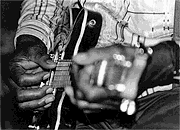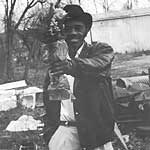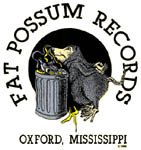Back to Goin' Down South
|
Video - R.L. Burnside - Snake Drive |
Fat Possum Official Site
Fat Possum Store Fat Possum Artists on tour |
| Fat Possum Records, the widely known record label raved for keeping the blues alive, went bankrupt five years after it was founded in1991. At age 22, Matthew Johnson, who was then a maniacal college student, stumbled upon a little dance shack near Holly Springs, Mississippi. Inside this jagged juke joint were Junior Kimbrough and R.L. Burnside playing a gust of raw and powerful blues until dawn on a Sunday. This burst of rough blues was so potent that Johnson took his next four-hundred dollar student loan check and launched a label that would make the blues pertinent to new audiences. |  |
Housed between a police station and a Baptist church in the small town of Water Valley, Mississippi, Fat Possum is an archive of recordings from some of the best raw blues artists in the country. This collection of unpolished blues recordings includes Junior Kimbrough, R.L. Burnside, T-Model Ford, Jelly Roll kings, Paul Wine Jones, 20 Miles, The Black Keys, and many others.

Paul Jones
The main publishing name the company goes by is “Big Legal Mess,” quite true to the various legal and distribution battles that have plagued the label over the years. Fat Possum is constantly hounded by creditors due to problems with the Capricorn distribution label. The dispute with Capricorn led Fat Possum into a two-year dry spell of not being able to release any music.
In addition, Fat Possum could not persistently keep tabs on the rough bunch of rowdy musicians they claimed for the label. Nearly every musician under Fat Possum has served prison time, wrecked the occasional car, had too much to drink, or simply died of old age resulting in halted production.
However, despite the all the legalities and tribulations, Johnson and collaborator Bruce Watson brought originality to the usual blues recording. They added innovative rock and hip-hop sounds to these established blues greats, giving the blues a new, bitter taste different than the normal B.B. King flavor. Some of these modernisms did not go without heavy assault from blues purists, of course. Even Burnside himself claimed to have not liked the re-mixed version of his songs initially.
Johnson and Watson scramble to run a business and are constantly on the lookout for new artists thanks to a parent company, Epitaph, pulling them out of bankruptcy in 1996. Currently, what keeps Fat Possum on the edge is a continual strive to capture that initial intensity in the music that struck Johnson more than a decade ago and release these Mississippi rumblings to the public. It is either that or the fact that most of us are astonished they stayed in business.
Do you want to watch these guys in action? Well, there is a DVD titled, "You See Me Laugin':The Last of the Hill Country Blues Men." It shows R.L. Burnside, Cedell Davis, T-Model Ford, and Junior Kimbrough with special interviews of Bono, Iggy Pop, and The John Spencer Blues Explosion.

Most of the footage, however, was shot by a few filmmakers out of Austin, Texas (who just recently finished a documentary for Flaming Lips) for another movie titled, "Hill Stomp Hollar." This movie won best documentary in 1999 South By Southwest Film Festival, but now can no longer be screened or sold anywhere. I contacted the filmmakers behind this movie who said that Fat Possum records refused to license the music rights and therefore the director was forced to sell them the raw footage to recoup his investment.
"You See Me Laughin'" ultimately was reviewed by the New York Times and went on to the Leeds Film Festival in the UK.
